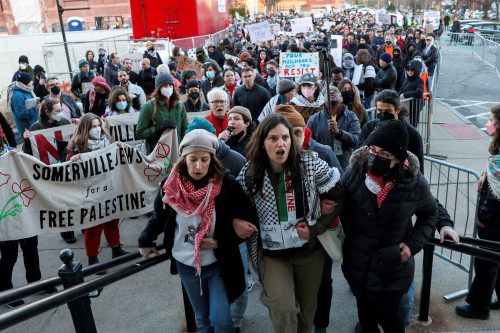By Nate Raymond
(Reuters) – A federal judge in Vermont questioned on Monday whether the Trump administration would instigate a “constitutional crisis” by not releasing a Turkish student at Tufts University from immigration custody if he concluded her arrest was unlawful.
U.S. District Judge William Sessions raised that prospect during a hearing in Burlington as he suggested he may order authorities to move Rumeysa Ozturk from the Louisiana detention center she has been in for nearly three weeks back to Vermont, where she was briefly held after her arrest last month.

Ad RAD Intel
While Tech Wobbles, This AI Standout Soars
Nvidia, Amazon, and others are slipping-but RAD Intel is up 20% in Q1 alone. Backed by Adobe and Fidelity Ventures, with 14 years of R&D and clients like Hasbro and MGM, RAD Intel is redefining AI marketing ROI.
Shares at $0.60-for now. Explore RAD Intel Today
DISCLOSURE: This is a paid advertisement for RAD Intel's Reg A offering. Please read the offering circular and related risks at invest.radintel.ai.
The judge heard arguments in the case after a federal judge in Massachusetts transferred the 30-year-old’s lawsuit challenging her detention to Vermont rather than dismiss it or send it to Louisiana as the U.S. Justice Department wanted.
Ozturk’s arrest by masked agents on a street in the Boston suburb of Somerville was captured in a viral video that has turned her case into a high-profile example of Republican President Donald Trump’s efforts to deport pro-Palestinian activists on U.S. campuses who have spoken out against Israel’s war in Gaza.
Acting U.S. Attorney Michael Drescher argued that the case did not belong in Vermont and that the “wide amount of discretion” Congress vested in the executive branch to oversee immigration meant Sessions lacked authority to order her release.
Sessions, an appointee of Democratic President Bill Clinton, acknowledged the case involved a “confusing area of law.” But he said Drescher’s argument raised a fundamental question about what the administration would do if he ruled for Ozturk.
“If the government then says, ‘oh, no, she can’t be released because we have a detention order in immigration, which is inviolate, and she’s not going to be released,’ then we’re in a constitutional crisis,” Sessions said.
Drescher responded he did not “want to be perceived in any way suggesting that we’re not going to abide by an order of the court.” But he said the law was clear Ozturk needed to pursue her bail request before an immigration judge, not Sessions.
“It’s not me who is saying this, it’s Congress who said this,” Drescher said.
The sole basis U.S. authorities have provided for revoking Ozturk’s visa was the opinion piece she co-authored that criticized Tufts’ response to calls by students to divest from companies with ties to Israel after the onset of the Gaza war and to “acknowledge the Palestinian genocide.”
Her lawyers at the American Civil Liberties Union argue the arrest marked a clear violation of her free speech and due process rights under the U.S. Constitution that should warrant her immediate release.
Ozturk was moved to Louisiana despite the filing of a lawsuit in Massachusetts a day earlier by a lawyer for the student and a judge’s order there barring her from being moved out of the state without 48 hours’ notice.
By the time that order came down, Immigration and Customs Enforcement had already taken her to Vermont, where she was held briefly before being flown to Louisiana. Rather than dismiss her case, a Massachusetts judge on April 4 transferred the case to Vermont, where she was located when the lawsuit was first filed.
Her lawyers say that since being taken into ICE custody, Ozturk has suffered several asthma attacks. They say her health remains at risk while at the detention facility in Basile, Louisiana, which “is notorious for its inadequate medical care.”
Jessie Rossman, a lawyer for Ozturk with the ACLU of Massachusetts, urged Sessions to act “expeditiously” if he was to order her returned to Vermont, saying every day that Ozturk, who is a Fulbright scholar and PhD student, remains detained is harming her education and right to free speech.
Her continued detention, Rossman said, “sends a very dangerous message to everyone else that if you do something against the government in terms of your speech, you’re going to be punished.”
(This story has been corrected to fix the identity of the president who appointed the judge, in paragraph 6)
(Reporting by Nate Raymond in Boston, Editing by Alexia Garamfalvi and Rod Nickel)



